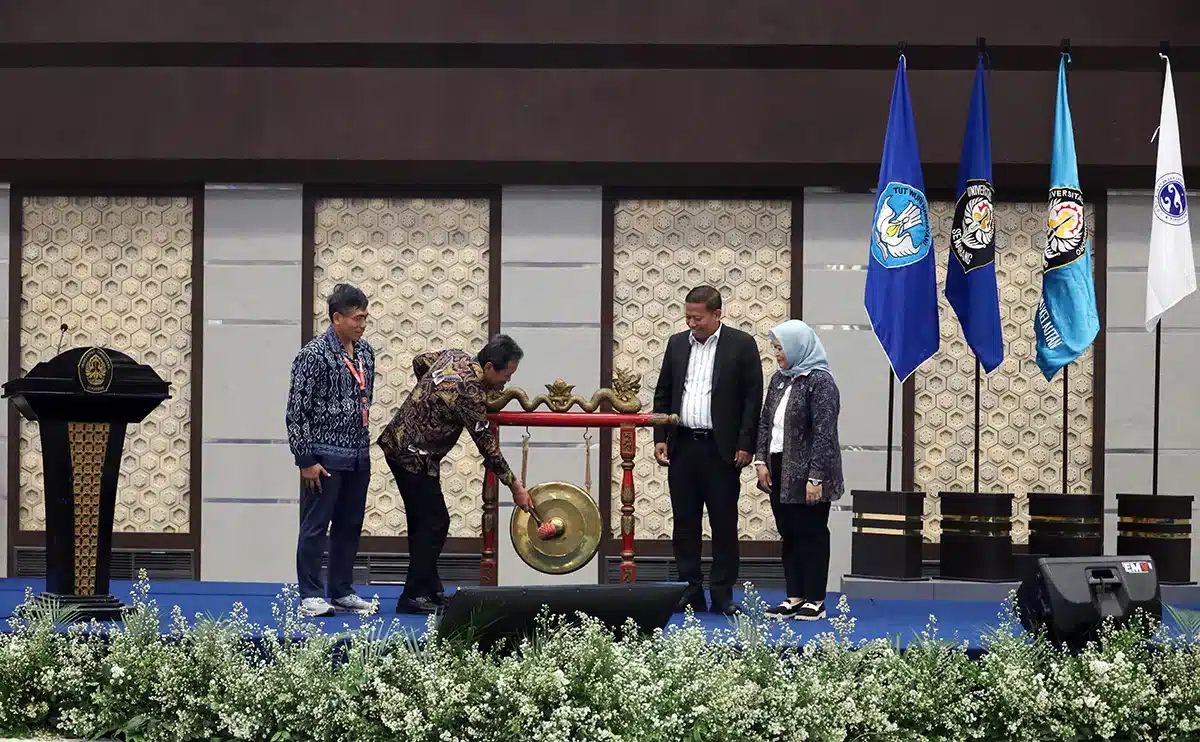UNDIP, Semarang (October 8, 2025) – Universitas Diponegoro (UNDIP) hosted the 13th International Fisheries Symposium (IFS) under the theme “ASEAN Fisheries and Marine Resources for Global Sustainability.” The international symposium, held at the Muladi Dome, UNDIP Multipurpose Building, from October 6 to 9, 2025, gathered hundreds of participants from 16 countries in the Asia-Pacific region. The event was organized by the Faculty of Fisheries and Marine Science (FPIK UNDIP) in collaboration with the ASEAN Fisheries Education Network (ASEAN-FEN) and the Indonesian Association of Oceanologists (ISOI).
On the second day (8/10), Coordinating Minister for Food Affairs Zulkifli Hasan delivered his remarks virtually. The 13th IFS 2025 also featured the Minister of Marine Affairs and Fisheries of the Republic of Indonesia, Sakti Wahyu Trenggono, as the keynote speaker, and the Deputy Minister of Foreign Affairs of the Republic of Indonesia, Arif Havas Oegroseno, as a plenary speaker. This second day also marked the convening of the 21st Indonesian Oceanologist Association Conference (PIT ISOI) 2025.
In his virtual address, Coordinating Minister for Food Affairs Zulkifli Hasan warmly welcomed the enthusiastic participants of IFS 2025, describing the symposium as a form of collaboration and a concrete step toward strengthening global marine potential. “Together, let us enhance ocean capacity to achieve sustainable marine conservation and food sovereignty,” he concluded.
As the keynote speaker, the Indonesian Minister of Marine Affairs and Fisheries Sakti Wahyu Trenggono emphasized Indonesia’s strategic geographic position and the urgent need to strengthen the blue economy. The blue economy, he explained, is a sustainable development concept focused on the innovative use of marine and coastal resources while maintaining healthy marine ecosystems. “In the coming years, the global population will grow by around 30% by 2050. Land-based food sources will no longer be sufficient to feed everyone, so we must supplement them with marine-based food, also known as blue food. There are more than 2,500 marine species that can serve as food sources—with higher protein content, lower carbon emissions compared to livestock-based food, sustainable production, and significant potential to boost coastal community economies,” he explained.
Minister Trenggono further highlighted that beyond shrimp, Indonesia’s key marine commodities include tilapia, crab, seaweed, and lobster. He emphasized that strengthening the blue economy must go hand in hand with conserving Indonesia’s rich marine biodiversity. “According to research by the Ministry of Marine Affairs and Fisheries (KKP), approximately 18,000 fishing vessels are operating in Indonesian waters. How well are our marine conservation zones being protected? This phenomenon marks our shared responsibility. Through this international symposium, let us unite ideas to protect our oceans,” he urged.
Deputy Minister of Foreign Affairs, Arif Havas Oegroseno, presented a plenary session on “The Strategic Role of ISOI toward Food Security from the Sea and Shore.” He stated that Indonesia, as the world’s largest archipelagic nation, forms the foundation of international maritime law, particularly the 1982 United Nations Convention on the Law of the Sea (UNCLOS). “To protect our seas, we must pay attention to small independent fishermen—for instance, through government subsidies funded by the national budget, such as insurance and training programs. This is about implementing economic justice. In eastern Indonesia, for example, infrastructure is limited, but natural resources are abundant. Fishermen there can catch a plentiful supply of fish but lack adequate cold storage facilities, resulting in waste. Without access to export markets, they miss out on opportunities. With cold storage, their efficiency could increase by up to 80%,” he said. Oegroseno called on ISOI members to develop solutions to challenges in managing marine resources aligned with SDG #14 Life Below Water.
UNDIP Rector Prof. Dr. Suharnomo, S.E., M.Si. officially opened the second day of The 13th IFS 2025, expressing gratitude and pride for the presence of distinguished marine and fisheries experts as speakers and participants. Prof. Suharnomo said, “Let us realize sustainable marine and fisheries management while addressing global challenges and climate change. The discussion topics at IFS 2025 encompass food security, economic development, and community welfare—reflecting UNDIP’s tagline, Noble and Valuable.”
Nani Hendiarti, Deputy for Environmental and Forestry Management Coordination and Chairperson of ISOI, stated that ISOI has submitted a policy brief to the Ministry of Marine Affairs and Fisheries regarding the revitalization project of North Coast (Pantura) aquaculture ponds, aiming to enhance their management and benefit coastal communities.
“We are delivering science-based policy to strengthen blue food production and food security through multi-stakeholder collaboration. We must safeguard productivity for integrated ecological and economic sustainability,” Nani stated.
The symposium continued with a talk show featuring:
- Dr. Hansan Park (Director, Korea-Indonesia Marine Technology Cooperation Research Center / MTCRC)
- Prof. Dr. Ocky Karna Radjasa (Head of Earth and Maritime Research Organization, National Research and Innovation Agency)
- Ir. Koswara, M.P. (Director General of Marine Management, Republic of Indonesia)
- Dr. Agus Santoso (Director of the CLIVAR Project, Ocean University of China & UNSW-Australia)
- R. Dwi Susanto, Ph.D. (Senior Researcher, University of Maryland)
The successful implementation of this international symposium represents a tangible contribution from UNDIP in advancing the Sustainable Development Goals (SDGs) #14, Life Below Water, #13, Climate Action, and #3, Good Health and Well-being. (Public Communication/UNDIP/Titis)












